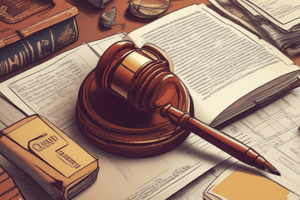Podcast
Questions and Answers
What is the primary purpose of business law?
What is the primary purpose of business law?
Business law sets the legal framework and rules governing business activities, ensuring fairness and order in the marketplace.
What are the five essential elements of a valid contract?
What are the five essential elements of a valid contract?
Offer, acceptance, consideration, capacity, and legality.
What is a breach of contract, and what are some potential remedies?
What is a breach of contract, and what are some potential remedies?
A breach of contract happens when one party fails to fulfill their contractual obligations. Potential remedies include monetary damages, specific performance, or rescission.
Explain the difference between real property and personal property.
Explain the difference between real property and personal property.
What key areas are covered under intellectual property law?
What key areas are covered under intellectual property law?
What is the primary function of a patent?
What is the primary function of a patent?
What are trademarks used to protect?
What are trademarks used to protect?
What types of works are typically protected by copyright?
What types of works are typically protected by copyright?
What are two examples of legal areas covered by employment law?
What are two examples of legal areas covered by employment law?
What is the legal term for a civil wrong that results in harm to another person or their property?
What is the legal term for a civil wrong that results in harm to another person or their property?
What are two features that are typically included in a contract for the sale of goods?
What are two features that are typically included in a contract for the sale of goods?
What is the main purpose of corporate law?
What is the main purpose of corporate law?
What is the term for confidential information that gives a business a competitive advantage?
What is the term for confidential information that gives a business a competitive advantage?
What are two methods of resolving disputes besides litigation?
What are two methods of resolving disputes besides litigation?
How can businesses be held liable for the actions of their employees?
How can businesses be held liable for the actions of their employees?
What is one type of intentional tort?
What is one type of intentional tort?
Flashcards
Trade Secrets
Trade Secrets
Confidential business information that provides a competitive advantage.
Employment Law
Employment Law
Regulates the relationship between employers and employees, covering areas like hiring and discrimination.
Liability
Liability
Legal responsibility for actions causing harm or damage, often from contracts or negligence.
Dispute Resolution
Dispute Resolution
Signup and view all the flashcards
Tort Law
Tort Law
Signup and view all the flashcards
Negligence
Negligence
Signup and view all the flashcards
Sales of Goods
Sales of Goods
Signup and view all the flashcards
Corporate Governance
Corporate Governance
Signup and view all the flashcards
Business Law
Business Law
Signup and view all the flashcards
Contract
Contract
Signup and view all the flashcards
Offer
Offer
Signup and view all the flashcards
Acceptance
Acceptance
Signup and view all the flashcards
Consideration
Consideration
Signup and view all the flashcards
Intellectual Property
Intellectual Property
Signup and view all the flashcards
Patent
Patent
Signup and view all the flashcards
Breach of Contract
Breach of Contract
Signup and view all the flashcards
Study Notes
Introduction to Business Law
- Business law encompasses the legal rules and regulations governing business activities, impacting nearly every aspect of doing business.
- Crucial areas include contracts, property, intellectual property, and employment law.
- Adhering to business law is key for successful operations, preventing legal issues and ensuring fair practices.
- Common legal issues for businesses include breach of contract, negligence, and intellectual property infringement.
Contract Law
- Contracts are legally binding agreements between parties.
- Essential elements for a valid contract: Offer, acceptance, consideration, capacity, and legality.
- Offer: A clear proposal to enter a contract.
- Acceptance: Unconditional agreement to the offer's terms.
- Consideration: Something of value exchanged between parties.
- Capacity: Parties must legally be able to contract (e.g., not minors).
- Legality: The contract's purpose must be lawful.
- Breach occurs when a party fails to fulfill obligations. Remedies include damages or specific performance.
- Types of contracts: express, implied, bilateral, unilateral.
- Contract formation types: formal (e.g., deeds) and informal.
Property Law
- Property law governs ownership, use, and transfer of property, encompassing:
- Real property (land, buildings).
- Personal property (tangible and intangible assets).
- Key aspects include ownership rights, easements, liens, and property disputes.
- Land use regulations, zoning laws, and environmental regulations are linked to property law.
- Ownership transfer (sale, gift, inheritance) is governed by property law.
Intellectual Property Law
- Intellectual property law protects creations of the mind.
- Types: patents, trademarks, copyrights, and trade secrets.
- Patents: Protect inventions, allowing exclusive use/manufacturing for a period.
- Trademarks: Protect brand names, logos, and distinguishing marks.
- Copyrights: Protect original works (literary, dramatic, musical), and others.
- Trade Secrets: Confidential business information offering a competitive edge.
Employment Law
- Employment law regulates employer-employee relationships.
- Key areas include hiring, wages, discrimination, and termination.
- Employment laws vary by jurisdiction, often prohibiting discrimination based on race, gender, religion, and national origin.
- Safe working conditions and employee benefits (e.g., sick leave) are also crucial.
Liability and Dispute Resolution
- Legal liability stems from contract breaches, negligence, or wrongful acts.
- Businesses can be liable for employee actions.
- Methods for resolving disputes include negotiation, mediation, arbitration, and litigation.
- Choosing dispute resolution methods can affect costs and relationships.
Torts
- Tortious conduct is a civil wrong causing harm to another person or property.
- Key categories include negligence and intentional torts.
- Negligence involves breach of care leading to foreseeable harm.
- Intentional torts are deliberate actions causing harm (e.g., assault, battery, defamation).
- Torts can have significant legal and financial consequences for businesses.
Sales of Goods
- Governments regulate commercial transactions, including sales of goods.
- Key contractual elements include product description, price, payment terms.
- Implied warranties protect buyers from defective products.
- Product liability laws outline business liabilities for defective goods.
Corporate Law
- Corporate law addresses the formation, operation, and dissolution of corporations.
- Covers corporate structure, governance, and shareholder rights.
- Different business structures (sole proprietorships, partnerships, corporations) have unique legal characteristics and responsibilities.
- Corporate governance refers to internal policies and procedures.
Studying That Suits You
Use AI to generate personalized quizzes and flashcards to suit your learning preferences.
Description
Explore the fundamentals of business law, covering its rules and regulations that govern business activities. This quiz delves into important areas such as contracts, property, and employment law, emphasizing the critical nature of adhering to legal standards in business. Assess your understanding of contract formation and the essential elements that make contracts valid.




